This marvelous essay by French Philosopher, activist, and Christian Mystic Simone Weil came along at just the right time for me. I’ve been studying the Yoga Sutra of Patañjali while completing my 200 –hour yoga certification and thinking a lot about the yogic discipline of Ahimsa, or non-harming. In doing some research on Weil after reading the essay, I find that she learned Sanskrit after becoming interested in the Bhagavad Gita and the Upanishads of India. I wonder if she might not also have run across the Yoga Sutra or maybe she absorbed the concept of ahimsa from the other two texts. Either way, the ideas she develops 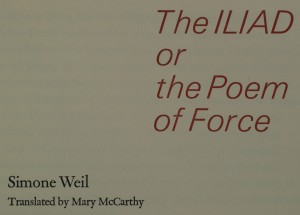 regarding the use of force and war in The Iliad really resonated with the term. Her familiarity with the Iliad makes sense as she had already mastered ancient Greek by the time she was twelve, maybe in part due to her love for this first, and according to her, only epic of the Occidental world. On top of this resonance with my personal situation right now, it’s a timely reminder in this age of perpetual war of the futility of force and war as a way to make the world better.
regarding the use of force and war in The Iliad really resonated with the term. Her familiarity with the Iliad makes sense as she had already mastered ancient Greek by the time she was twelve, maybe in part due to her love for this first, and according to her, only epic of the Occidental world. On top of this resonance with my personal situation right now, it’s a timely reminder in this age of perpetual war of the futility of force and war as a way to make the world better.
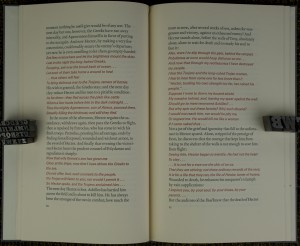 Weil was living in France and writing this essay when the country fell to Hitler’s Germany. Before that she was in Spain volunteering to help fight the Nationalists in the Spanish Civil war. So she had some experience with the use of force in war. Between those two events, she had some religious experiences that resulted in her lifelong devotion to Christianity in particular as well as other religious traditions.
Weil was living in France and writing this essay when the country fell to Hitler’s Germany. Before that she was in Spain volunteering to help fight the Nationalists in the Spanish Civil war. So she had some experience with the use of force in war. Between those two events, she had some religious experiences that resulted in her lifelong devotion to Christianity in particular as well as other religious traditions.
All of these factors combine to make this essay a lucid interpretation of the use of force in The Iliad. Contrary to what I though back in junior high school upon first encountering the Iliad, she argues that neither Achilles nor Hector are the hero of the epic. In her words:
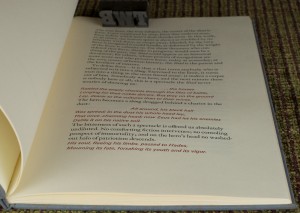 The true hero, the true subject, the center of the Iliad is force. Force employed by man, force that enslaves man, force before which man’s flesh shrinks away.
The true hero, the true subject, the center of the Iliad is force. Force employed by man, force that enslaves man, force before which man’s flesh shrinks away.
What the Greeks understood, and what the Occident seems to have forgotten, is that the use of Force destroys everyone:
Force is as pitiless to the man who possesses it, or thinks he does, as it is to its victims; the second it crushes, the first it intoxicates.
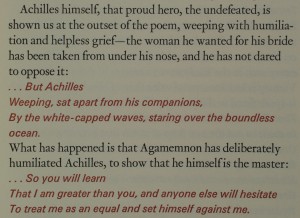 To be honest, so many of the passages in this book struck me as remarkable that I would have highlighted most of the book had I read it in paperback. Likewise, I could provide multitudes of passages here that I noted down as I read. I’ve decided not to do that and will just limit myself to a few of the gems.
To be honest, so many of the passages in this book struck me as remarkable that I would have highlighted most of the book had I read it in paperback. Likewise, I could provide multitudes of passages here that I noted down as I read. I’ve decided not to do that and will just limit myself to a few of the gems.
Expanding her analysis of the use of force to commit violence and in full-scale war, Weil has this to say:
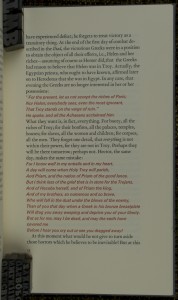 …violence obliterates anybody who feels its touch. It comes to seem just as external to its employer as to its victim. And from this springs the idea of a destiny before which executioner and victim stand equally innocent, before which conquered and conqueror are brothers in the same distress. The conquered brings misfortune to the conqueror, and vice versa.
…violence obliterates anybody who feels its touch. It comes to seem just as external to its employer as to its victim. And from this springs the idea of a destiny before which executioner and victim stand equally innocent, before which conquered and conqueror are brothers in the same distress. The conquered brings misfortune to the conqueror, and vice versa.
And
…war effaces conceptions of purpose or goal, including even its own “war aims.” It effaces the very notion of war’s being brought to an end. To be outside a situation so violent as this is to find it inconceivable; to be inside it is to be unable to conceive its end. Consequently, nobody does anything to bring this end about.
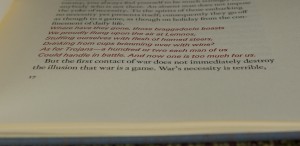 Finally, she talks about the genius of the culture from which The Iliad emerged. Based on the way the use of force is portrayed in the book, she draws the conclusion that the genius of the Greek writers and philosophers in understanding force and not being seduced into blind admiration for it has not been transmitted to any of the succeeding Western cultures, and thus none of the “epics” since the destruction of Ancient Greece can stand up to The Iliad.
Finally, she talks about the genius of the culture from which The Iliad emerged. Based on the way the use of force is portrayed in the book, she draws the conclusion that the genius of the Greek writers and philosophers in understanding force and not being seduced into blind admiration for it has not been transmitted to any of the succeeding Western cultures, and thus none of the “epics” since the destruction of Ancient Greece can stand up to The Iliad.
In any case, this poem is a miracle. Its bitterness is the only justifiable bitterness, for it springs from the subjections of the human spirit to force, that is, in the last analysis, to matter. This subjection is the common lot, although each spirit will bear it differently, in proportion to its on virtue. No one in the Iliad is spared by it, as no one on earth is. No one who succumbs to it is by virtue of this fact regarded with contempt. Whoever, within his own soul and in human relations, escapes the 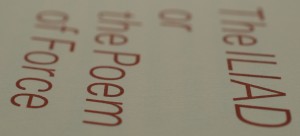 dominion of force is loved but loved sorrowfully because of the threat of destruction that constantly hangs over him.
dominion of force is loved but loved sorrowfully because of the threat of destruction that constantly hangs over him.
The Lapis Press edition is an elegant treatment of this powerful work. The book was designed by Les Ferriss, Sam Francis, and Jack W. Stauffacher. Simply bound in cloth with paper spine labeling and printed on Superfine paper. To differentiate Weil’s writing from passages of from The Iliad, the text is set in Monotype Van Dijck and Univers 56 in black and burgundy ink, respectively.
Sharing her love for the The Iliad and her views of the corrupting nature and futility of force, I’m sure I will be back to reread this essay many times. That makes owning the book in such an elegant and nicely designed edition even sweeter.
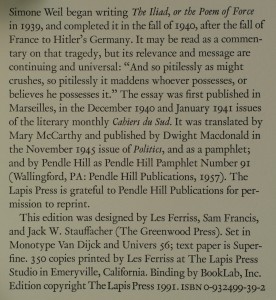 AVAILABILITY: The Lapis Press printed The Iliad or the Poem of Force in an edition of 350. Copies of this edition can sometimes be found on the secondary market. The work remains in print in trade editions.
AVAILABILITY: The Lapis Press printed The Iliad or the Poem of Force in an edition of 350. Copies of this edition can sometimes be found on the secondary market. The work remains in print in trade editions.



As soon as your ‘new post’ email came in, I was on your website to properly see this particular edition. It is a superb essay that I have had on my shelves for a while in the form of Kim Merker’s beautiful Stone Wall Press edition.
I did not know of this Lapis Press edition, and am now most tempted to get one. Although I don’t think it as handsome as the Merker edition, which I love for its Romanée setting and the lovely handmade it is printed on, it is clearly very attractive indeed (I am particularly taken by the use of the red-printed Univers for the Iliad excerpts).
It is refreshing to see a ‘simpler’ book on your site, rather than the sumptuous, well-illustrated editions that are usually highlighted. Although I’m more than happy to read about (and own) the fancier tomes, I am most pleased that you have represented a fine press edition that isn’t all ‘bells and whistles’. This edition is instead a rather fine example of an excellent text presented well (but not extravagantly) in a simpler form, using good, solid typography as its means of visual appeal.
Best wishes for the New Year, and keep the excellent reviews coming!
Mark
Thanks a lot for the review of this book. It is such a lovely book and thanks to you one copy is being shipped to my home and eagerly looking forward to reading it.
Thanks a lot for the review. I purchased the book after reading this review and loved it!. Thanks again.